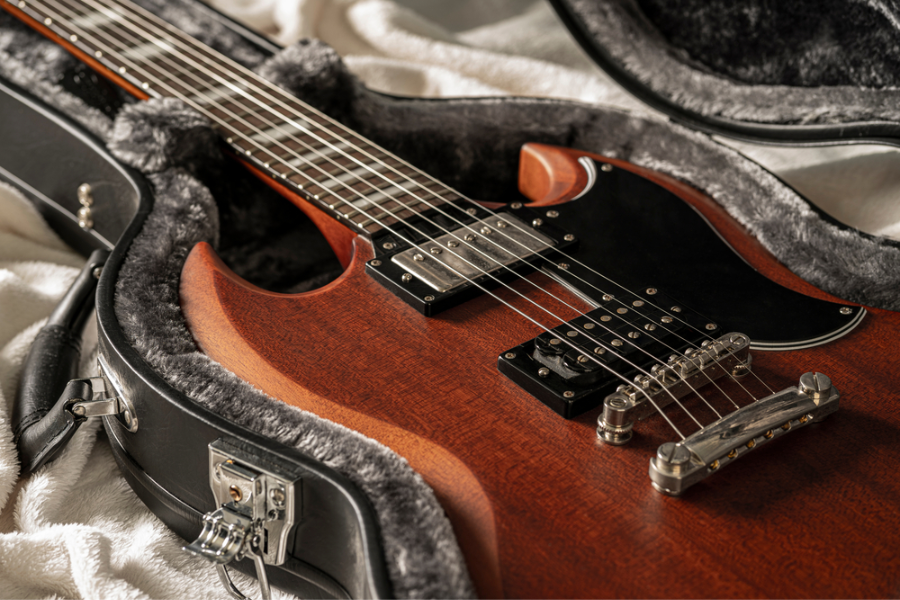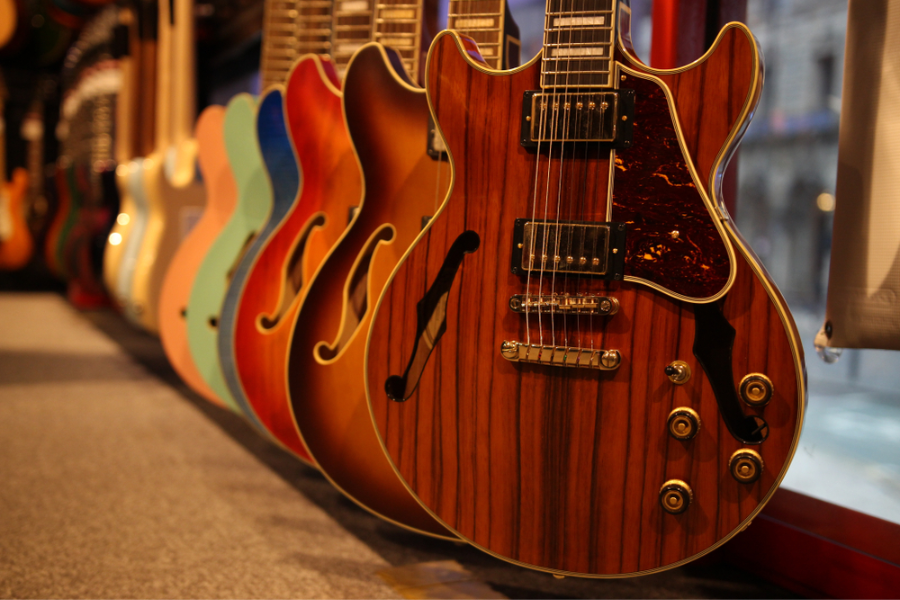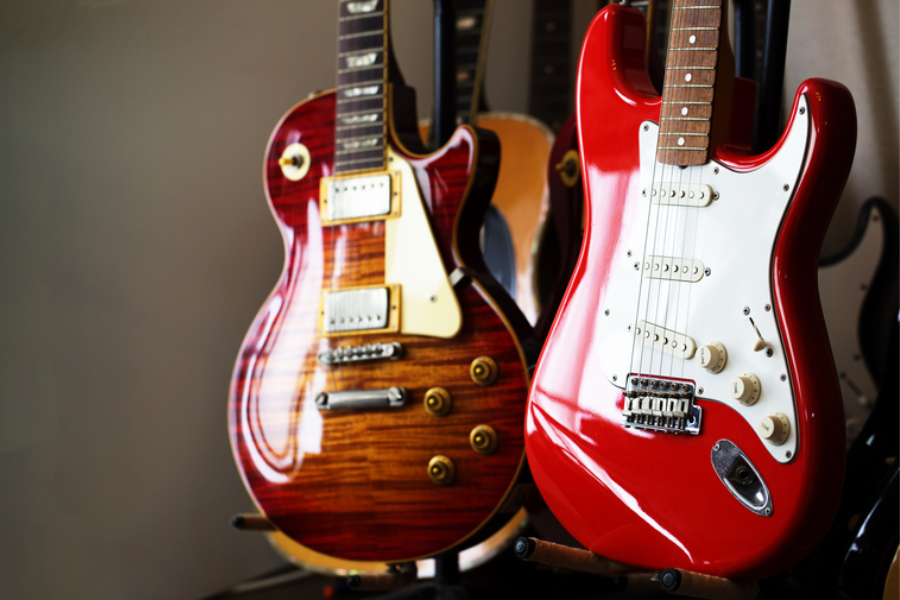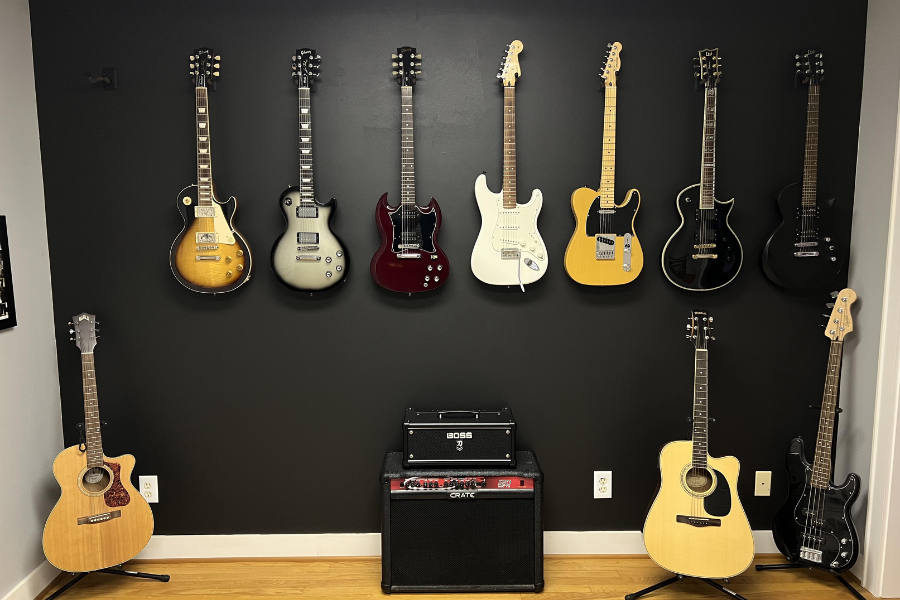Ever found your favorite electric guitar collecting dust or, worse, not sounding as awesome as it used to because it was stored all wrong? It’s a scenario that’s all too common, and yet, entirely preventable. Storing your guitar might require more than just put it in its case and forget about it until the next jam session.
In this comprehensive guide, Eguitarmania is going to find out How To Store Electric Guitar effectively. From the ideal environmental conditions to the best practices for long-term storage, this article is packed with expert advice, practical tips, and simple steps every guitarist can follow.
Travel: Keeping Your Guitar Safe on the Go
Traveling with an electric guitar presents a unique set of challenges for musicians. Making sure your guitar gets to its destination safely is very important, whether you’re going to a gig, on tour, or just taking it on vacation.

What’s the Best Way to Transport Your Electric Guitar?
- Hard Cases: Made from strong materials like wood, ABS plastic, or aluminum. Hard cases are made to protect your electric guitar as much as possible. These cases are made to resist drops, changes in air, and harsh weather, so your guitar will be safe while you travel.
- Gig bags: Gig bags are an option to hard cases that are lighter and more flexible. They are easy to carry because they are made of soft materials and often have padding insides. Gig bags are great for artists who want to be mobile and easily accessible.
Hard cases vs. gig bags
| Feature | Hard Cases | Gig Bags |
| Protection | Superior protection against impacts, pressure, and environmental changes. | Offers decent protection with padding but less effective against severe impacts. |
| Portability | Heavier and bulkier. | Lightweight and equipped with shoulder straps . |
| Security | Locking mechanisms for added security. | Usually do not include locks. |
| Cost | Higher Price | Generally more affordable |
Guitars are best protected by hard cases. Wood or ABS construction and plush, cushioned inside keep your guitar secure. They provide piece of mind and are safer against theft with lock features. However, they have issues. These are bulky and difficult to handle on busy subways or buses. Due of their durability, they cost more.
However, gig bags are lighter and simpler to handle. The gig bag’s backpack straps made it portable. I recall carrying my guitar easily. The additional pockets protect cables and picks. Just note that they’re not as safe as hard cases. Without a sturdy case, my guitar could have avoided a little ding after a bump. I discovered this the hard way. Traveling artists may struggle with gig bags’ weatherproofing.
Tips for packing and protecting your guitar during transit
Here are some personal tips for electric guitar when traveling:
- Neck Support: Use a small towel or bubble wrap to provide extra support for the guitar’s neck and headstock. This is crucial for preventing movement within the case that could lead to damage.
- Loosen the Strings: Before packing your guitar, loosen the strings slightly to relieve tension on the neck, which can help prevent neck warping due to pressure changes, especially during air travel.
- Fill Empty Spaces: Make sure the area surrounding the instrument is completely filled. To keep the instrument from moving about while in transit, fill any spaces with items such as clothing, bubble wrap, or foam.
- Carry On When Possible: If flying, always try to carry your guitar onboard as a carry-on item to avoid the risks associated with checked baggage. Check airline policies ahead of time, as regulations and accommodations for instruments can vary.
- Climate Considerations: When traveling to areas with significantly different climate conditions, moisture or too dry conditions may affect the material of the electric guitar.
Garage: Is It a Safe Space for Your Guitar?
The garage, often seen as a convenient storage space for everything from cars to Christmas decorations. The garage presents itself as a potential storage solution for electric guitar. However, storing a guitar in the garage comes with its own set of challenges and risks.

Why Reconsider Garage Guitar Storage?
Environmental concerns
Significant temperature and humidity fluctuations can be detrimental to guitars. Excessive humidity can lead to wood swelling, while too little can cause it to crack. Moreover, temperature extremes can warp the wood and damage the finish of your guitar.
Potential hazards
Garages hold cars, lawn equipment, gasoline, insecticides, and solvents. Over time, toxic fumes can damage guitar coatings and components. Dust in electronics and moving parts might cause operational concerns. Garages are also attracted to rats and insects, who may bite your guitar’s glue.
How Can You Make the Garage a Guitar-Friendly Zone?
You may make a garage a safer location to store guitars if you take the required steps.
Actionable steps you can take in each area:
Measure indoor conditions: Use a hygrometer to monitor the humidity levels and a thermometer to keep an eye on the temperature within your garage.
Adjust the moisture: deploy a dehumidifier to reduce moisture in the air if levels are consistently above 55%, or a humidifier if below 45%.
Insulate the Garage: Seal gaps around doors and windows and think about putting insulation panels on garage doors and walls during the rainy season. This helps keep the temperature fixed and keeps wet air from coming in from the outside.
Ventilation: Ensure good airflow to prevent stagnant air that could promote mold growth. Simple solutions include opening windows regularly or installing an exhaust fan.
Secure Storage Solutions For Electric Guitar in Garage
By following these steps, you can significantly improve the conditions of your garage, making it a safer place to store your electric guitar.
Notice this : Do not put the guitar on the floor
Use Quality Guitar Stands or Racks: Choose stable, cushioned floor storage stands. Make sure each guitar has ample room in a multi-guitar rack to avoid bumps.
Choosing the Right Wall Hangers: Hanging the guitar up can reduce the affects of humidity
Positioning: Even within the garage, position your guitar away from direct sunlight, radiators, or any heat sources.
Bedroom: The Ideal Spot for Your Guitar?
We are here to help you store your guitar without sacrificing space or style, including creative display options and tips for protecting your instrument from accidents and spills.

What Are the Benefits of Storing Your Guitar in Your Bedroom?
- Stable Humidity and Temperature: Bedrooms often have more consistent environmental conditions compared to other areas of the home, such as basements or garages, reducing the risk of wood damage.
- Decorative Element: Guitars can add a unique decorative touch to your bedroom, showcasing your passion for music as part of your interior design.
- Motivation to Practice: Seeing your guitar regularly can serve as a visual cue, motivating you to practice more often.
- Convenience for Spontaneous Sessions: Having your guitar within arm’s reach makes it easy to pick up and play whenever inspiration strikes, even for just a few minutes.
Creative Ways to Store Your Guitar In Bedroom
Decorative Hooks: Install decorative hooks or a vintage coat rack on the wall to hang your guitar straps, adding a functional yet stylish element to your room.
Behind the Door Rack: Utilize the back of your bedroom door with an over-the-door rack designed for guitars. This space-saving solution keeps your guitar hidden when the door is open, making it perfect for small spaces.
Transparent Cases: For those who want to protect their guitar without hiding its beauty, a transparent acrylic case can be mounted on the wall. This offers protection from dust and damage while allowing the guitar to be visibly displayed.
Floating Shelves: Use sturdy floating shelves above your workspace or dresser to create a decorative display for your guitar. Ensure the shelf is securely mounted and capable of supporting the guitar’s weight.
By taking a look at these options, you should be able to choose a way to store your instrument that is both functional and aesthetically pleasing for your bedroom.
Maintenance Tips For Long Term Usage
Dirt, dust, and grime can lead to more significant issues like corrosion, wear, and impaired functionality.
- Wipe Down Strings and Body: Use a soft, dry cloth to remove oils, sweat, and grime from the strings and body after playing. This prevents buildup that can corrode strings and damage the finish.
- Fretboard Care: Clean the fretboard with a specialized cleaner and conditioner every few months, depending on use. This keeps the wood healthy and prevents drying and cracking.

- Regular String Changes: Change your strings as needed based on play frequency and sound quality. Fresh strings maintain tone and prevent fret wear.
- Ideal Humidity Level: Keep your guitar in an environment with 45% to 55% humidity. Use a room humidifier or dehumidifier to maintain this range.
- Cable Management: Properly manage and route cables during use to avoid tripping or pulling the guitar off its stand.
Final thought
In conclusion, by understanding and implementing a few key practices, you can significantly extend the life of your instrument. Remember to regularly clean, control humidity and temperature, and choose secure storage solutions. Not only safeguard your instrument, but also ensure that it remains a source of joy and creativity for years to come.









